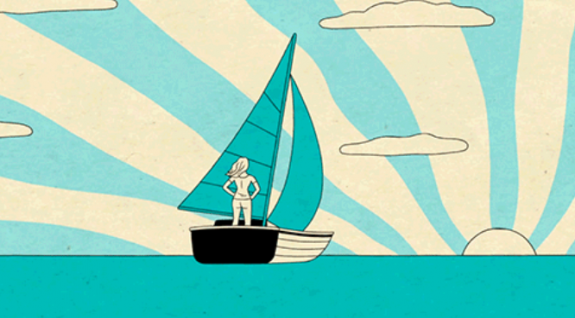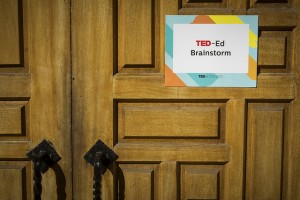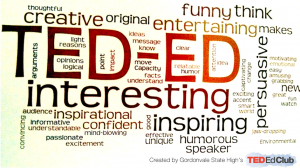
10 inspiring commencement speeches about creativity and courage
In the Venn diagram of storytelling methods, the commencement speech is part poetry, part cat poster. The best commencement speeches transcend the limitations of the genre to provide inspiration for all of us. Below, read 10 great commencement speeches by writers and artists on how to live with more creativity and courage.
Bill Watterson, Kenyon College 1990
With all due respect to John Stuart Mill, maybe utilitarianism is overrated.
If I’ve learned one thing from being a cartoonist, it’s how important playing is to creativity and happiness…At school, new ideas are thrust at you every day. Out in the world, you’ll have to find the inner motivation to search for new ideas on your own. With any luck at all, you’ll never need to take an idea and squeeze a punchline out of it, but as bright, creative people, you’ll be called upon to generate ideas and solutions all your lives. Letting your mind play is the best way to solve problems.
For me, it’s been liberating to put myself in the mind of a fictitious six year-old each day, and rediscover my own curiosity. I’ve been amazed at how one ideas leads to others if I allow my mind to play and wander. I know a lot about dinosaurs now, and the information has helped me out of quite a few deadlines.
A playful mind is inquisitive, and learning is fun. If you indulge your natural curiosity and retain a sense of fun in new experience, I think you’ll find it functions as a sort of shock absorber for the bumpy road ahead.
David Carr, University of California at Berkeley School of Journalism 2014
Don’t let anybody tell you that you should have been involved back in the day, the so-called “Golden Age.” Paul’s right: It wasn’t all that golden. It wasn’t. A lot of those stories sucked.
Right now, you have access to all-known thought about everything you’re going to cover the minute you step up to it. We never had that. We had some guy named Morty who worked in obits who might know a little something about a little something.
On top of that, a bunch of old, crusty white guys who looked a lot and talked a lot like me, they decided what the news was. It’s not really up to us anymore. It’s up to you. It’s up to your audience.
There are infinite definitions for a successful life. Maybe you want to be the president, maybe you want be a great parent, or maybe you want to pretend to rip your tooth out and marry a stripper in a movie. All equally noble choices.
But simply asking ourselves what we want is easy. Another far more powerful question that can be much harder to explore, but has the potential to bring you breathtaking clarity, is simply: What do I fear?
Success lies in the tension between fear and discovery. That tension will always be there, but so long as your desire to explore is greater than your desire to not screw up, you’re on the right track.
Maya Angelou, Holton-Arms School, 2011
There are ways in which you can develop courage. One way is to speak to people. Speak to people you don’t know. Say good morning, good morning. You have no idea what you may have done for someone. She may have just hung up the phone from having a nurse say, “Miss Jones, the doctor wants you to come back in, he’s not satisfied with these X-rays.” You don’t know.
Neil Gaiman, the University of the Arts, 2012
Life is sometimes hard. Things go wrong, in life and in love and in business and in friendship and in health and in all the other ways that life can go wrong. And when things get tough, this is what you should do.
Make good art.
I’m serious. Husband runs off with a politician? Make good art. Leg crushed and then eaten by mutated boa constrictor? Make good art. IRS on your trail? Make good art. Cat exploded? Make good art. Somebody on the Internet thinks what you do is stupid or evil or it’s all been done before? Make good art. Probably things will work out somehow, and eventually time will take the sting away, but that doesn’t matter. Do what only you do best. Make good art.
Shonda Rimes, Dartmouth College 2014
Focus on something outside yourself.
Devote a slice of your energies towards making the world suck less every week. Some people suggest doing this will increase your sense of well-being. Some say it’s good karma.
I say that it will allow you to remember that, whether you are a legacy or the first in your family to go to college, the air you are breathing right now is rare air. Appreciate it.
Adam Savage, Sarah Lawrence College 2012
Raymond Chandler didn’t write a single word of any consequence until his 40s. Julia Child learned to cook at 40! Clint Eastwood directed his first film at 41. Don’t be afraid to be a late bloomer. Repeatedly.
Remember that you have time to figure out what you want to do. Who you need to be. Where you want to go. You have time to fail. You have time to mess up. You have time to try again. And when you mess that up, you still have time. Just so long as you’re willing to work hard.
Anna Quindlen, Villanova University 2000
Get a life in which you are not alone. Find people you love, and who love you. And remember that love is not leisure, it is work. Each time you look at your diploma, remember that you are still a student, still learning how to best treasure your connection to others. Pick up the phone. Send an email. Write a letter. Kiss your Mom. Hug your Dad. Get a life in which you are generous.
Margaret Atwood, the University Of Toronto 1983
Nor did anyone have the foresight to inform me that the best thing I could do for myself as a writer would be back and wrist exercises. No one has yet done a study of this, but they will, and when they start excavating and measuring the spines and arm bones of the skeletons of famous writers of the past I am sure they will find that those who wrote the longest novels, such as Dickens and Melville, also had the thickest wrists.
George Saunders, Syracuse University 2013
Do all the other things, the ambitious things — travel, get rich, get famous, innovate, lead, fall in love, make and lose fortunes, swim naked in wild jungle rivers (after first having it tested for monkey poop) — but as you do, to the extent that you can, err in the direction of kindness. Do those things that incline you toward the big questions, and avoid the things that would reduce you and make you trivial. That luminous part of you that exists beyond personality — your soul, if you will — is as bright and shining as any that has ever been. Bright as Shakespeare’s, bright as Gandhi’s, bright as Mother Teresa’s. Clear away everything that keeps you separate from this secret luminous place. Believe it exists, come to know it better, nurture it, share its fruits tirelessly.
And someday, in 80 years, when you’re 100, and I’m 134, and we’re both so kind and loving we’re nearly unbearable, drop me a line, let me know how your life has been. I hope you will say: It has been so wonderful.





I think we must also include the commencement speech given by Steve Jobs at the Stanford must be included in the list. Even though he wasn’t an artist by proffession but he did definitely create apple and had the courage to never give up.
I was thinking the same as I looked through the list and totally agree with you Kinnari Vora!
These are brilliant speeches, no doubt. But I do have doubts whether today’s graduates will be able to have the same level of education and creativity to make a similar speech in front of future grads. I suppose that the reason for this is the insufficient attention paid to classical literature, especially Shakespeare. We celebrate Shakespeare’s birthday in universities, but this is not enough. At that time, when students with persistence studied Hamlet, in addition to it, I always recommend to get acquainted with Macbeth. As I consider that this work contains monologues and expressions which may be of good use in real life, especially on commencement speeches.
Here is a great study guide on Shakespeare’s Macbeth. if you for one reason or another haven’t heard of it:
https://studentshare.net/student-help/macbeth-by-shakespeare-guide
I truly believe that Macbeth and Shakespeare remain a part of the world culture, but not something that is old and archaic, which can be surface-explored and later forgotten as useless. And I always conveyed this thought to my students.